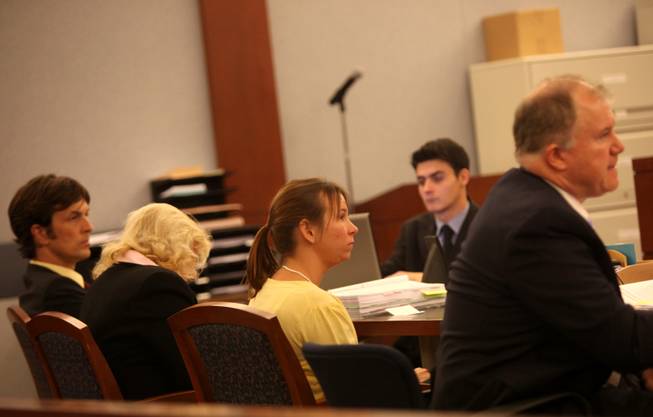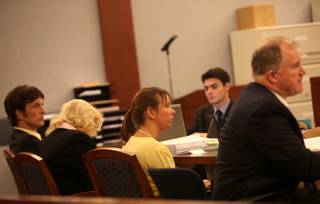
Amy Busefink, ACORN’s deputy regional director, who authorities say was part of a voter registration scheme, appears in court Tuesday in Las Vegas.
Published Tuesday, Sept. 29, 2009 | 1:27 p.m.
Updated Tuesday, Sept. 29, 2009 | 9:06 p.m.
Sun Archives
- ACORN, ACLU suit could have Nevada implications (7-22-2009)
- Court hearing set over voter registration allegations (7-15-2008)
- Criminal charges filed against ACORN, two employees (5-4-2008)
- State: No false or stifled votes here (10-29-2008)
- Voter fraud isn’t what – by some – it’s cracked out to be (10-12-2008)
- You can trust that your vote counts in Nevada, election officials say (10-12-2008)
- Gibbons, Gansert care deeply about voter verification (10-9-2008)
- Corrections department unaware of potential voter fraud (10-9-2008)
During the 2008 election cycle, the Las Vegas office of the organization ACORN was looking for ways to motivate its best canvassers who were collecting voter registration cards, former Field Director Christopher Edwards said.
Edwards, testifying at a court hearing, said he created a bonus incentive program called “Blackjack” or “21+” that awarded an extra $5 to any canvasser who collected at least 21 registration cards.
His immediate supervisor, Amy Busefink, welcomed the idea and he bragged about its success on conference calls with his peers around the country, Edwards said.
But paying canvassers for the number of registration cards they collect violates state laws because it encourages canvassers to turn in phony forms, says the state Attorney General’s Office.
Edwards, Busefink and ACORN, the Association of Community Organizations for Reform Now, were each charged with 13 felony counts in connection with the Blackjack program and because the organization allegedly required an illegal quota of cards or else canvassers could lose their jobs.
Edwards testified on Tuesday as the prosecution’s key witness in a preliminary hearing in Las Vegas Justice Court.
Last month, he accepted a deal to plead guilty to two gross misdemeanor counts of conspiracy to commit the crime of compensation for registration of voters.
He will receive probation for cooperating with the attorney general.
Busefink and ACORN representatives deny they ever knew about the program and say Edwards acted independently.
As for the quota, the state is misrepresenting the organization’s “target” or “goal” of 20 cards per shift, said Clare Crawford deputy political director for the national organization.
Canvassers collected 13 cards per day on average and were not terminated for failing to collect 20 cards, she said.
“Our policies were set at the national office. People had to get approved for increases in pay or the other bonuses had to be approved,” she said. “Ms. Busefink was at some point in the Nevada office, became aware of (the Blackjack program) and told him to stop. He said he would. But when she left, he continued to do it.”
Canvassers were paid $8 or $9 per hour and could be given bonuses for driving, taking the bus or working in extreme heat.
Those bonuses are legal because they are not tied to registration cards, said prosecutor Conrad Hafen, Chief Deputy Attorney General.
Edwards testified that ACORN encouraged him to create bonus programs during a training session in Dallas in 2008.
“That was part of the field director training — telling us how we can use incentives to maximize our registration numbers,” he said. “I ran the programs ACORN taught me to run.”
Canvassers worked about four out of six hours per day in the field collecting cards. Edwards testified that some canvassers could get about 17 cards in less than two hours, then stop working but continue to get paid.
The incentive program was intended to motivate them to collect during the full four hours, he said.
“It was really just showing that they were being recognized for doing exceptional work,” he said.
The program was not written down in a memo or manual but, Edwards said, Busefink approved the plan in a phone conversation in late July or early August 2008, just before it was implemented.
Edwards said Busefink responded by suggesting the number be set at 26 for the bonus. Busefink, who worked out of Florida, visited the Las Vegas office in August 2008 for about three days to check on operations.
Although the Blackjack program was not put on paper, it was written on an erasable whiteboard in the office, Edwards said.
The program was explained on the board along with names of canvassers who achieved the goal when Busefink visited, Edwards said.
Edwards said he couldn’t recall if they talked about the program but was sure Busefink never told him to stop offering it.
“I was never told by Amy Busefink nor anyone else to stop that program,” he said. “Nor was I ever told by Amy Busefink or anyone else that there was any legal jeopardy concerning that program.”
A few days before the Blackjack program began, Edwards sent an e-mail to Busefink and Kimberly Olsen, ACORN’s director of voter registration, about an incentive program for canvassers that collected a certain number of Spanish-language cards. Olsen sent a one-word response: “No.”
The organization’s attorney, Lisa Rasmussen, asked Edwards why he didn’t e-mail anyone about the Blackjack program.
He replied that most communications within ACORN were conducted by phone and that Busefink had approved the program in one of the phone conversations.
Defense attorneys focused on the possibility that Edwards had a grudge against ACORN for allegedly offering him a higher position than he achieved. Edwards said he was told initially that he would be hired as a political director, a position above field director.
While training in Miami shortly after he was hired, however, he learned he would be in the lower position.
After spending one day as field director in Las Vegas, he learned his position was actually as a political organizer, a step below field director.
The experience of giving orders all day only to learn he didn’t have the authority to do so was “humiliating,” he said.
After about six weeks, he was promoted to field director, a position in which he remained until the end of the voter registration period.
Prosecutors also presented the chief investigator from the Secretary of State’s Office and three former ACORN employees.
Two of those employees, Joseph Terry and Dwain Dennie, were canvassers who said they were told they had to collect 20 cards a day or they would be fired.
Both also said they collected the Blackjack bonus numerous times.
Earlier in the day, the state’s chief investigator into alleged voter fraud by the ACORN organization said two regional supervisors knew of the allegedly illegal bonus program and that the organization instituted a quota policy for its canvassers, based on computer documents obtained last year in a search of ACORN’s Las Vegas office.
Colin Haynes, an investigator with the Secretary of State’s Office, testified that the investigation failed to prove the organization committed fraud but turned up evidence of the quota system and bonuses paid to canvassers if they exceeded the quota of 20 registration cards per shift.
Attorneys for Busefink and ACORN said they didn’t expect to call witnesses during the preliminary hearing, which was continued to Wednesday afternoon.
Judge William Jansen said he would make his decision following arguments on whether to send the case to district court, where it could go to trial.


Join the Discussion:
Check this out for a full explanation of our conversion to the LiveFyre commenting system and instructions on how to sign up for an account.
Full comments policy